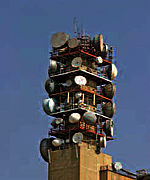Former and Current Revolutionary Guards Commanders Clash
» Revolutionary Guards Must Return Telecommunications Corporation
Several months after Iran’s state telecommunications corporation was taken over by companies affiliated with the Islamic Passdaran Revolutionary Guards Corps (IRGC) in a sham deal, one (pro- administration) principalist Majlis lawmaker hinted that the corporation may be returned to the government. Eliyas Naderan, a lawmaker representing Tehran, who is a former member of the IRGC, told Alef news website that several eighth Majlis lawmakers are working on a plan for the return of the corporation to the government.
He also announced that Majlis’ Strategic Research Center headed by Ali Tavakkoli, another lawmaker form Tehran, is examining the legal aspects of the exchange and will release its opinion on the matter soon.
Voiding the controversial deal that turned over Iran’s telecommunications firm to the IRGC would mean that the largest transaction ever in Iran’s stock market would be nullified.
Iran’s telecommunications firm was considered to be among a handful of state-owned companies that were profitable. Last fall, it was turned over to a consortium composed of investment firms operating under the IRGC’s cooperative foundation.
Majid Solemanipour, who serves as the CEO and director at one of those investment firms, passed away under suspicious conditions along with his wife shortly after the takeover. Their deaths were officially blamed on gas asphyxiation.
On the surface, the takeover was touted as a step toward implementing Article 44 of the Islamic Republic’s constitution, which contains provisions for privatization of public property. However, the only private firm competing with the IRGC for the takeover was disqualified for security reasons. Economic experts, private sector activists and even Majlis lawmakers were outraged by that decision.
The IRGC’s interference in the Iranian economy began shortly after the end of the eight-year Iran-Iraq war, when former president Ali Akbar Hashemi Rafsanjani was in office. Responding to a comment by the supreme leader’s representative in the IRGC, who said that the IRGC’s entry in the economy was made possible by Hashemi Rafsanjani, the former president said, “First, at that time the entire stock of the country’s industrial and logistical resources were in IRGC’s control. It was not possible to utilize these resources after the war in any other way, and I made a tactical decision to free a huge portion of our national resources under the IRGC’s control. Second, assuming that was the case, what justifies the IRGC’s heavy presence in the economy today?”
In his latest note in response to the passage of the United Nations Security Council’s latest round of sanctions against Iran, former prime minister and green movement leader Mir-Hossein Mousavi wrote, “An IRGC that is more concerned with the volatility of the dollar on the open market and interference in the affairs of banking, the stock market and export and import contracts cannot be trusted with the security of our nation and our revolution. “
Former Majlis speaker Mehdi Karoubi has also accused the IRGC of operating 60 unlicensed ports in southern Iran to facilitate the import and expert of goods without government regulation.


